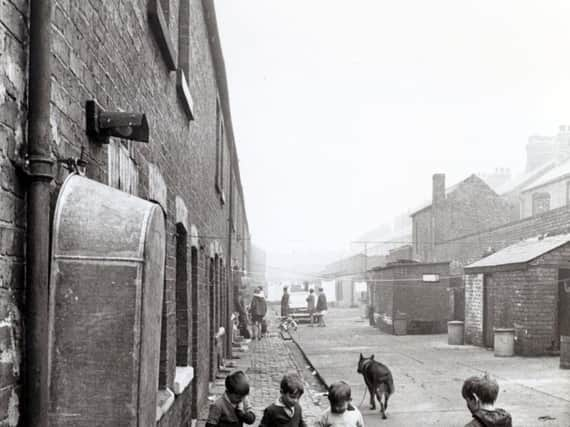Readers' letters - January 31


Living in the 1940s, parked cars were non-existent because nobody could afford to run one. Passing motor transport down the street was infrequent – the regular user being the horse-drawn brewery and coal carts, together with the manual fruit and veg, and rag and bone ones. In this traffic-free area, the children were able to play in relative safety.The boys and girls played hopscotch on the pavement, marbles in the street gutters. On the pavement, an intrepid gambler would prop up a 3d or 6d piece at a very low angle. From a distance, challengers rolled their marbles trying to hit the target and win the money – only genuine coloured marbles were allowed, no colourless ‘gobstoppers’. I remember coming home at the end of the day with a shilling winnings for successful hits, and a pocketful of marbles which I had won from my turn setting up the target. Throwing cigarette cards at the side of house walls was another pastime – nearest one took the card. We also played whips and tops, and turned skipping ropes across the street in which both girls and boys joined. There were impromptu football games with a rubber/tennis ball with the passageways as goals. Cricket was played with the street lamppost as the wicket. Should the soft ball be hit onto a house roof, someone would climb the drain pipe to retrieve it, or if that was too dangerous, we would improvise a long piece of string with a solid object on the end and throw it onto the roof gutter and try to drag the ball down. There were relay races around neighbouring streets and tag games. Many of us can look back with appreciation of the community spirit in the 1940s and wish that the children of today could enjoy the fun that we had in a safe environment in our childhood days.Cyril OlsenAddress suppliedenvironmentShort-term gain long-term pain I was dismayed to see the signs that the strip of land with trees at the traffic lights on Goldenhill, Leyland, is to be auctioned. It was only a few weeks ago that traffic congestion along this road was highlighted as it reduces air quality. This increases the risks of cardio-vascular disease, is detrimental to child health and worsens the condition of those with lung disease and asthma. Lancashire County Council has been quoted as being unwilling to treat this area as a special case and that a regional solution should be found. In view of the role trees play in absorbing air borne pollutants (see DOE study 2010), selling this land and removing these trees will only increase pollution and traffic noise for those walking along the road and living close by. Is this another case of short-term monetary gain (the auctioneers suggest it could be used for parking and it appears to be the council that is selling) rather than the long-term health of the population? What about some tree preservation orders and more tree planting?S Broadyvia emailpoliticsYes Prime MinisterRe: South Ribble Council Meeting. As a member of the public, I went along to a recent meeting, mainly out of curiosity to see our councillors at work, but also to hear the debate on a few of the issues on the agenda. Now, I am sure there is a considerable amount of good work that goes on. However, there was little evidence of this at the meeting, with various councillors using the meeting to score points against others, confusion over a number of issues and questions asked which were not really answered.It reminded me a little of the sitcom Yes Prime Minister. Maybe I expected too much, but I found myself shaking my head more than a few times in disappointment, frustration as the meeting progressed. So would I attend again? Yes. Would I hope to see a more professional and purposeful meeting? Yes. Did the meeting give rate payers get value for money? Not really.Roy SullivanLeylandwasteA rubbish increaseHaving got away with a 20 per cent increase of garden waste charges last year, we face an 18 per cent increase this year. This amounts to a six-fold increase compared to the proposed 2.99 per cent increase overall. Is this justified by a similar percentage pay increase for bin men? The charges appear to be following a similar one to the hospital car parking charges. Introduce additional charges from previous policies, then gradually, or in both cases, drastically, increase them over time as the norm.Denis LeeAshtonINDUSTRYNo surprise at Carillion news
Whilst I was watching the lunchtime news today, it was reported that the shamed firm Carillion had continued to pay managers their bonuses, while avoiding paying money into the workers’ pension fund. Hands up all those who are the tiniest bit surprised? No, I thought not!ALLAN FAZACKERLEYvia email